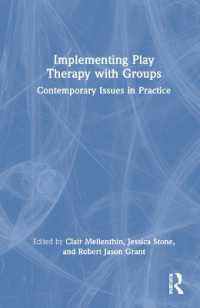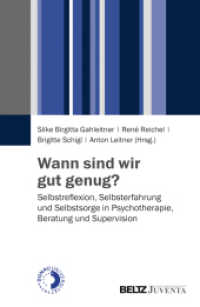- ホーム
- > 洋書
- > 英文書
- > History / World
基本説明
New in paperback. Hardcover was published in 1995. This book explores how a group of nineteenth-century British historians came to terms with one of the formative periods in their nation's past - the seventeenth century in general and the era of Cromwell and the Puritans in particular.
Full Description
This 1995 book explores what the Victorians said about the Stuart past, with particular emphasis on changing interpretations of Cromwell and the Puritans. It analyses in detail the historical writings of Henry Hallam, Thomas Babington Macaulay, Thomas Carlyle and Samuel Rawson Gardiner, placing them in a context that stresses the importance of religious controversy for the nineteenth century. The book argues that the Victorians found the Stuart past problematic because they perceived a connection between the religious disputes of the seventeenth century and the sectarian discord of their own age. Cromwell and the Puritans became an acceptable part of the national past only as the English state lost its Anglican exclusiveness. The tendency to accommodate Cromwell and the Puritans, particularly in the work of Gardiner, thus reflected a process of nation building that sought to remove sectarian divisions and which reached its climax as the Victorian age came to its close.
Contents
Preface; Acknowledgments; Introduction: politics, religion and history: David Hume and the Victorian debate; 1. Henry Hallam and early nineteenth-century Whiggism; 2. Thomas Babington Macaulay and Victorian religious controversy; 3. Puritanism and the ideology of dissent; 4. Samuel Rawson Gardiner and the search for national consensus; 5. Cromwell and the late Victorians; Epilogue: beyond the Victorians; Index.







